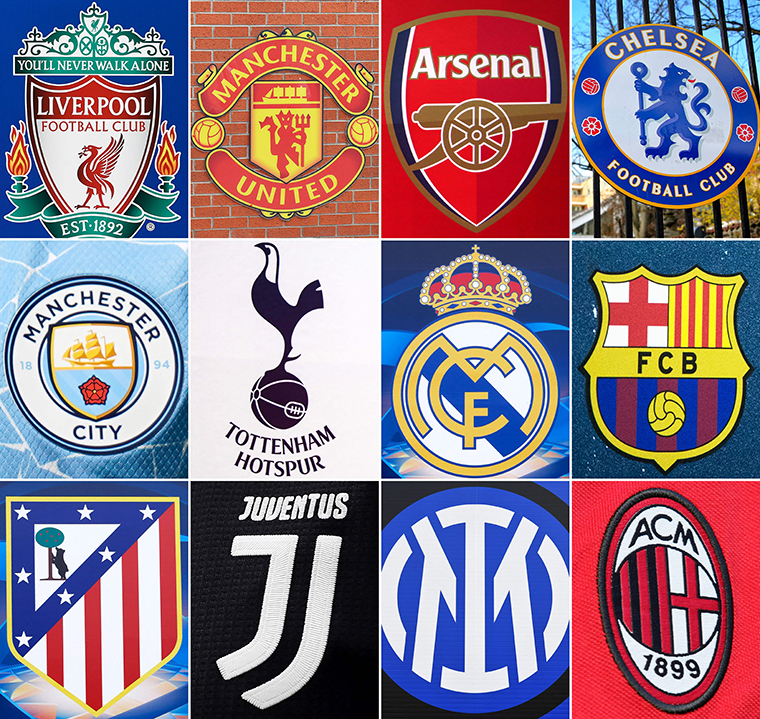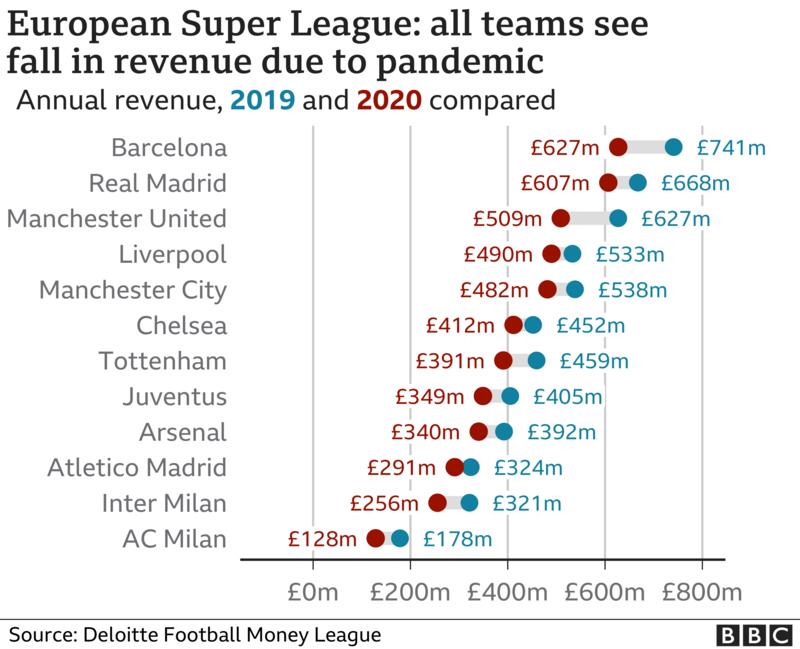The God-chosen league
20/4/21 21:58A dozen of Europe's wealthiest football clubs have agreed to create a Superleague, the biggest transformation in the most popular game in many decades. The competition, funded with 6 bn dollars by JPMorgan, is aiming to replace the Champions League, currently the best and most illustrious international football club competition on the continent.
The teams who've confirmed their participation are Real Madrid, Barcelona and Atletico Madrid from Spain, Manchester United, Manchester City, Liverpool, Arsenal, Chelsea and Tottenham from England, and Juventus, Milan and Inter from Italy. They've also announced that another 3 teams will be joining for the first season, which is planned to commence as soon as possible.

The news has triggered a power struggle in the game, the elite clubs facing fierce resistance from politicians, fan groups and sporting authorities across the continent, many vowing to oppose this split-up with all means possible.
Florentino Perez, Real Madrid's president, who has been elected the first Superleague chairman, has said the new elite alliance will be striving to help football at all levels. This whole thing is a pretty big deal by the way, because football has 4 billion fans across the world.
So this Superleague is planned to include 20 clubs, 15 of them permanent members, which means they cannot be relegated. The founder clubs have stated they would receive a one-time funding worth a combined 3.5 billion euro for infrastructure investments. The documents that have surfaced so far show that the founder clubs would also get additional 100-350 million euro for joining the competition, and they'll continue playing in their respective national leagues. The expected 4 billion euro revenue from the Superleague will mostly come from ticket sales, TV rights and sponsorships, and each participant club will be receiving 264 million euro annually. JPMorgan has not commented on the subject so far.
Interestingly, two of Europe's mega-clubs, French team Paris Saint-Germain and German team Bayern Munich are not included.
The timing of the founding declaration of the Superleague is no coincidence. It's coming days before the expected announcement of an alternative plan for a radical transformation of the existing Champions league, administered by Europe's football association, UEFA. The CL changes were expected to include more matches and opportunities for the bigger clubs to earn more money.
Last week the European Club Association, representing more than 200 leading clubs, included discussions on the proposed reform in the major club competitions. They agreed to allow UEFA to go ahead with the reform, but there was widespread discontent with the plan, since the leading clubs wanted to get bigger assurance for creating a joint enterprise that would control all media and sponsorship rights for the European club competitions. It's telling that the chairman of the European Club Association, Juventus president Andrea Agnelli issued his resignation from the body shortly thereafter, only to join the new Superleague as its vice-chairman.
UEFA's response to the rival initiative has been swift. They've said they'll work together with all top European football leagues and with the global football governing body, FIFA, in an effort to "stop this cynical project, based on the personal interest of a few clubs at a time when society needs solidarity more than ever". UEFA will look for all possible venues, including legal means, to prevent the launching of the Superleague. This includes a potential ban for club players from the Superleague to represent their national teams in the World Cup. UK prime minister Boris Johnson recently commented on Twitter that the plan would be "very harmful to football, and we support the football authorities in all their actions". French president Emmanuel Macron also said he welcomes the position of the French clubs who've refused to participate.
The fan organisation Football Supporters Europe believes the decision to create a Superleague would be the final nail in the coffin of European football, which will abandon everything that made the game so popular in the first place.

The fact is, though, that a considerable number of major teams have agreed to join the Superleague in principle. Many leading teams who've faced serious shortage of revenue during the pandemic, are very interested in this competition, which they believe would generate bigger income from regular top-level club matches every season. The league agreement could also include some aspects of expense control, like potential salary caps.
The Superleague would thus resemble the structure of the "closed" North American sports leagues, where club owners enjoy reliable profits, while the overall value of clubs is constantly growing. On the other hand, the lack of a promotion/relegation system might kill part of the excitement. But most importantly, it would further stratify football, making the rich even richer at the expense of the smaller and weaker clubs.
The teams who've confirmed their participation are Real Madrid, Barcelona and Atletico Madrid from Spain, Manchester United, Manchester City, Liverpool, Arsenal, Chelsea and Tottenham from England, and Juventus, Milan and Inter from Italy. They've also announced that another 3 teams will be joining for the first season, which is planned to commence as soon as possible.

The news has triggered a power struggle in the game, the elite clubs facing fierce resistance from politicians, fan groups and sporting authorities across the continent, many vowing to oppose this split-up with all means possible.
Florentino Perez, Real Madrid's president, who has been elected the first Superleague chairman, has said the new elite alliance will be striving to help football at all levels. This whole thing is a pretty big deal by the way, because football has 4 billion fans across the world.
So this Superleague is planned to include 20 clubs, 15 of them permanent members, which means they cannot be relegated. The founder clubs have stated they would receive a one-time funding worth a combined 3.5 billion euro for infrastructure investments. The documents that have surfaced so far show that the founder clubs would also get additional 100-350 million euro for joining the competition, and they'll continue playing in their respective national leagues. The expected 4 billion euro revenue from the Superleague will mostly come from ticket sales, TV rights and sponsorships, and each participant club will be receiving 264 million euro annually. JPMorgan has not commented on the subject so far.
Interestingly, two of Europe's mega-clubs, French team Paris Saint-Germain and German team Bayern Munich are not included.
The timing of the founding declaration of the Superleague is no coincidence. It's coming days before the expected announcement of an alternative plan for a radical transformation of the existing Champions league, administered by Europe's football association, UEFA. The CL changes were expected to include more matches and opportunities for the bigger clubs to earn more money.
Last week the European Club Association, representing more than 200 leading clubs, included discussions on the proposed reform in the major club competitions. They agreed to allow UEFA to go ahead with the reform, but there was widespread discontent with the plan, since the leading clubs wanted to get bigger assurance for creating a joint enterprise that would control all media and sponsorship rights for the European club competitions. It's telling that the chairman of the European Club Association, Juventus president Andrea Agnelli issued his resignation from the body shortly thereafter, only to join the new Superleague as its vice-chairman.
UEFA's response to the rival initiative has been swift. They've said they'll work together with all top European football leagues and with the global football governing body, FIFA, in an effort to "stop this cynical project, based on the personal interest of a few clubs at a time when society needs solidarity more than ever". UEFA will look for all possible venues, including legal means, to prevent the launching of the Superleague. This includes a potential ban for club players from the Superleague to represent their national teams in the World Cup. UK prime minister Boris Johnson recently commented on Twitter that the plan would be "very harmful to football, and we support the football authorities in all their actions". French president Emmanuel Macron also said he welcomes the position of the French clubs who've refused to participate.
The fan organisation Football Supporters Europe believes the decision to create a Superleague would be the final nail in the coffin of European football, which will abandon everything that made the game so popular in the first place.

The fact is, though, that a considerable number of major teams have agreed to join the Superleague in principle. Many leading teams who've faced serious shortage of revenue during the pandemic, are very interested in this competition, which they believe would generate bigger income from regular top-level club matches every season. The league agreement could also include some aspects of expense control, like potential salary caps.
The Superleague would thus resemble the structure of the "closed" North American sports leagues, where club owners enjoy reliable profits, while the overall value of clubs is constantly growing. On the other hand, the lack of a promotion/relegation system might kill part of the excitement. But most importantly, it would further stratify football, making the rich even richer at the expense of the smaller and weaker clubs.
(no subject)
Date: 20/4/21 19:14 (UTC)(no subject)
Date: 20/4/21 23:14 (UTC)(no subject)
Date: 21/4/21 16:51 (UTC)Boj saw it as a chance to make himself look good when the backlash became pretty extreme from everyone else involved in football, including some of the English Superleague clubs’ managers and players.
As a Spurs supporter, I can say categorically that my team has to earn its place in any competition; and should be able to compete properly with other clubs. Levy went for the money to pay for the new stadium. Which is wrong, but predictable given Levy’s general attitude to things.
Fan power, I guess.
(no subject)
Date: 21/4/21 18:59 (UTC)(no subject)
Date: 22/4/21 13:19 (UTC)